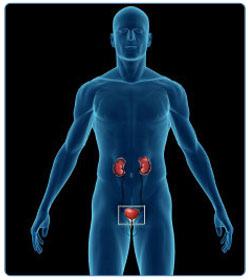- Hematuria (Blood in the Urine) - (https://www.niddk.nih.gov/health-information/urologic-diseases/hematuria-blood-urine)
- Hematuria in Children - (https://www.kidney.org/atoz/content/hematuria)
- What is Hematuria? - (http://urologyhealth.org/urologic-conditions/hematuria)
- Microscopic Hematuria (Persistent) - (http://www2.gov.bc.ca/gov/content/health/practitioner-professional-resources/bc-guidelines/hematuria)
What is Hematuria?
Hematuria refers to a condition where there is the presence of red blood cells (erythrocytes) in the urine. The bleeding may occur just once or it may be recurrent.
Normally, the urine is yellow in color due to the presence of a pigment called urobilirubin. This pigment results from the breakdown of hemoglobin, the oxygen-carrying protein of the red blood cells.
Microscopic Hematuria vs Frank Hematuria - In some cases, a large number of red blood cells may be present but they are visible only when viewed under a microscope (called microscopic hematuria), while in other cases the blood is clearly visible to the naked eye due to the red or a reddish brown color of the urine.
The quantity of blood in the urine is not a correct indication of the gravity of the underlying problem.
Whatever the type or nature of the condition, hematuria could be an indication of bleeding in the urinary system which includes the kidneys, ureters (the tubes that transport urine from the kidneys to the bladder), bladder, urethra (the tube that transports urine out of the bladder) and the prostate gland.
Pseudohematuria or Other Reasons why Urine may Appear Red - It must be noted that there may be different reasons for urine to take on a red tinge. If the red color of the urine is caused by any other factor besides red blood cells (RBCs), then the condition is referred to as ‘pseudohematuria.’
Color of the Urine -
The presence of pigments like porphyrin, myoglobin or betanin (after eating beetroot), eating berries, or rhubarb, food coloring or taking anti-psychotic medications such as chlorpromazine, and certain laxatives and tranquilizers can impart a red/pink tinge to urine.
Poisoning due to lead or mercury can cause urine to turn red due to excess amount of porphyrin in the urine.
An infection could be suspected if white blood cells (WBCs) are found along with the RBCs.
Hematuria often indicates different problems in men and women and occurs at a frequency of 10% in the general population.
Remember, drugs can not only cause urine to look red but sometimes even orange, green or black. These are some of the common drugs that can alter the color of urine –
Drugs that turn Urine Orange -
- Pyridium or phenazopyridine used for urine infections
- Rifampin - used to treat tuberculosis
- Vitamin B supplements
Drugs that turn Urine Black -
- Methyldopa or Aldomet - used to treat blood pressure
Drugs that turn Urine Blue or Green -
- Methylene blue dye

What are the Indications for Hematuria?
Indication
It is important to keep in mind that hematuria has multiple causes. In many people, blood in urine is seen without any associated problem while in some it is caused by factors such as physical exercise and may therefore not require treatment. During such instances it tends to resolve quickly.
However, hematuria can be caused by very serious conditions too and it is for this reason that a doctor has to be consulted as soon as blood is seen in the urine. Age is also a vital factor, as childhood causes may differ from the causes for adults.
What are the Types of Hematuria?
Hematuria is categorized into the following types -
- Microscopic Hematuria - When the RBCs in the blood are visible only through a microscope.
- Macroscopic or Gross Hematuria - When the urine is red, reddish brown or pink in color due to the excessive presence of RBCs. In these conditions blood clots may also be present.
- Idiopathic Hematuria - When a high number of RBCs are present in urine without any underlying cause.
- ‘Joggers hematuria’ - When hematuria results from jarring of the urinary bladder. This usually happens in a regular jogger or in a long-distance runner.
What are the Causes of Hematuria?
Adult – Male or Female
Stones in Urinary Tract
- Kidney stones
- Ureteric stones
- Bladder stones
Infections
- Kidney Infections such as pyelonephritis
Urinary Schistosomiasis
Urinary Tract Infection - Sexually transmitted diseases
- Systemic lupus erythematosus
- Acute Post-Streptococcal Glomerulonephritis
- Kidney/Urinary bladder stones
Tumors:
- Von Hippel-Landau
- Tumors (Malignant or benign)
Inflammation and Trauma:
- Trauma to the kidneys or the bladder
Hematologic, Hereditary, Metabolic and Cardiovascular causes:
- Sickle cell trait
- Malignant Hypertension
- Henoch-Schonlein Purpura
- Benign familial hematuria
- Hyperuricosuria
- Hypercalciuria
Medications and Exercise
- Antibiotics such as Cyclophosphamide and Penicillin.
- In some cases, aspirin or heparin can also cause hematuria.
- During extended periods of exercise there may be trauma to the bladder, dehydration and breakdown of red blood cells.
Hematuria in Male Patients
Besides the abovementioned, other causes include -
- Inflammation of the prostate Benign prostatic hyperplasia (enlargement)
- Cancer of the Prostate
Female Patients
The most common cause is -
Urinary tract infection
Hematuria caused by certain conditions varies with age -
- In preschool children - Wilms tumor is more frequent
- In high-school population - acute post-infectious glomerulonephritis
- In adults,- hematuria is often a sign of malignancy of the genitourinary tract such as bladder and prostatic tumors.

How do Race and Age Affect Hematuria?
The incidence of hematuria in specific racial groups is determined by the primary cause. Hematuria caused by sickle cell disease is more common in blacks than whites.
What are the Symptoms of Hematuria?
Most often blood in the urine is the single most common symptom and sign of hematuria.
The patient is thoroughly evaluated for symptoms and this may give an insight into the underlying reason for hematuria –
- Abdominal pain in the flank along with hematuria - perhaps indicative of a small stone in the kidney or ureter.
- Decreased urinary force/incomplete urination with occasional passing of blood in the urine, probably indicative of tumor or benign prostate hyperplasia (BPH).
- Fever &/or shivering with flank pain and hematuria sometimes could indicate kidney infection.
- Pain in the side or flank with occasional hematuria maybe a sign of kidney tumor.
- Urinary frequency (polyuria) pain (dysuria) or urgency in urination can be a symptom of bladder infection or sometimes even cancer.
- Passing of blood clots maybe due to bleeding from bladder. Thin long thread like clots usually originate from the bleeding kidney or sometimes from the ureter
- Unexplained weight loss with hematuria maybe due to underlying cancer of the kidney.

Duration
The duration of hematuria depends on its underlying cause. If it is caused by vigorous exercise, it will go away within 24 to 48 hours.
While hematuria caused by an infection will end as soon as the infection is cured, if it is caused by a kidney stone, it will last till the stone is removed.
What Tests are Required?
A complete physical exam is carried out with special focus on the abdomen, urinary tract, pelvis, genitals and rectum.
According to the American Urologic Association (AUA) guidelines, the presence of greater than 3 red blood cells per high powered field amounts to significant microhematuria in high risk patients (example older age group or if there is an occupational exposure to dyes) and it demands the following tests to be carried out -
- Upper tract imaging accomplished by a CT urogram remains the gold standard.
- Urine cytology - examination of the urine to study the various cells and rule out cancer.
- Cystoscopy - to study the inside of the bladder in detail in order to detect tumors or stones.
In older patients cystoscopy is often carried out. Blood tests, ultrasound, X-rays, Intravenous pyelogram (IVP) and CT Scan, are some of the effective diagnostic methods employed.
What are the Risk Factors for Hematuria?
- Male gender
- Older age
- Post- menopausal women
- History of cigarette smoking
- History of working in chemical factories especially related to benzene or chemical dyes
- Prior urologic treatment or disease
- Irritative voiding symptoms such as dysuria, urgency, frequency
- History of pelvic radiation
What is the Treatment for Hematuria?
Management of hematuria depends on the underlying cause. It varies from administering medications to performing surgery.
Treatment ranges from antibiotic therapy to surgery, depending on the underlying cause as mentioned below -
- Benign prostatic hyperplasia (BPH) - Avoid unsuitable foods/beverages/over the counter medications. Medications such as terazosin, tamsulosin, alfuzasin, finasteride or dutasteride are generally prescribed. Two drugs are generally used, single or in combination. If ineffective, endoscopic surgery may be carried out
- Kidney and bladder stones - Procedures to break /remove the stones may be necessary
- Kidney disease - Treated as necessary. May involve dialysis if there is kidney failure
- Medications that induce hematuria (such as aspirin, clopidogrel, quinine may need to be discontinued
- Trauma-induced hematuria - Treated according to the problem ranging from rest to surgery
- Urinary tract blockages - Removal of the blockage
- Infection-induced hematuria - Medications
- Cancer caused hematuria - Radiotherapy, chemotherapy, and surgery
What is the Prognosis of Hematuria?
Prognosis entirely depends on the underlying condition and the patient's response to treatment.
In some cases, hematuria is idiopathic and cannot be traced to a single cause. However it would be prudent for the patient to be monitored regularly. In case of recurrence, another cycle of evaluation will be necessary.
Mortality
Since hematuria is the result of various processes, the mortality rate of the condition depends on the primary process that initiated it. Generally children with isolated microscopic asymptomatic hematuria tend to do better than those associated with hypertension or proteinuria.
How to Prevent Hematuria?
- Drink plenty of fluids
- Eat a balanced diet and avoid excess salt and protein
- Urinate when you feel the urge and avoid holding the urine for long periods of time
- Avoid hygiene products that irritate the genital area










